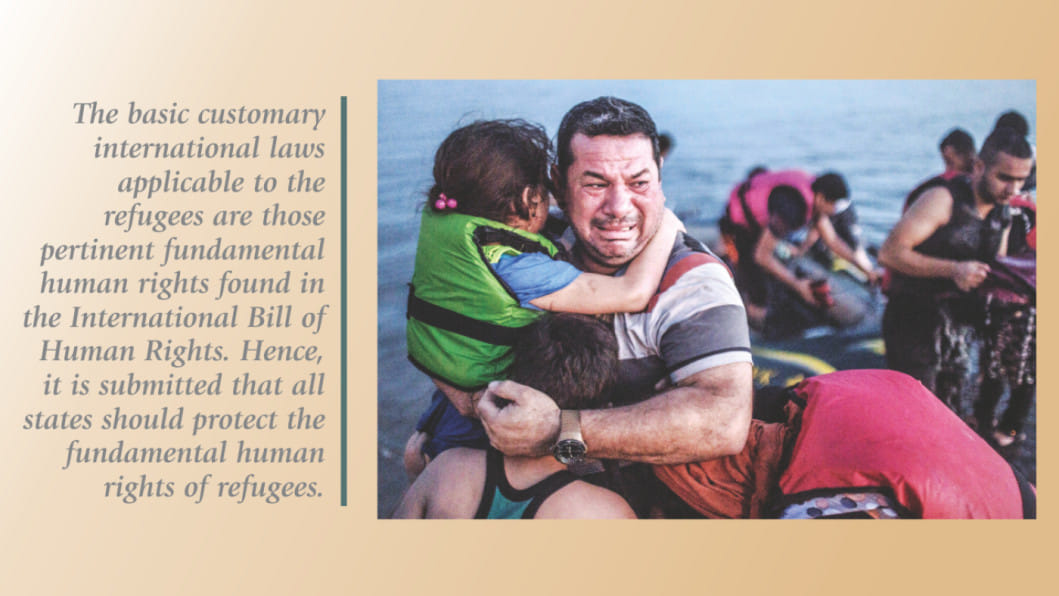OBLIGATIONS AND CONVENTIONS towards refugees

States are obliged for protection of refugees under international law on account of their membership of United Nations and signature or accession to International Refugee Instruments as well as International Human Rights Instruments. The legal basis for this international protection may either be customary international law or conventional international law. The basic customary international laws applicable to them are those pertinent fundamental human rights found in the International Bill of Human Rights. Hence, it is submitted that all states should protect the fundamental human rights of refugees under customary international law. Principle of non-refoulement is one of them.
Under the principle of non-refoulement a refugee shall not be expelled or returned in any manner whatsoever to the frontiers of territories where his life or freedom would be threatened on account of race, religion, nationality, membership of a particular social group or political opinion. It is the obligation of states both under customary international law and international instruments not to send them back. However, a refugee may not get the protection under this principle if there are reasonable grounds that the national security would be negatively affected. Indeed, it creates two situations. The former is connected with the national security interest of the state and the latter is related to the individual protection. Which one will be given priority? Is it the national security or individual protection? My standing is in favour of individual protection. The arguments are as follows:
a) Protection needs of individual would get priority: Some argue that in any way individual protection should not be neglected. It is the obligation of the states concerned both under international instruments and customary international law not to expel or return them where there is risk of persecution. Under the following international instruments states have the obligations towards refugees with regard to the non-refoulement principle:
* UN Convention on the Status of Refugees,1951
* International Covenant on Civil and political Rights(ICCPR),1966
* UN Convention Against Torture and Other Cruel ,Inhuman or Degrading Treatment or Punishment,1984
* Organization of African Unity Convention Governing the Specific Aspects of Refugee problems in Africa (OAU Convention),1969
* European Convention on Human Rights,1950
* The Charter of Fundamental Rights of the European Union,2009
* Council of Europe's Resolution on Minimum Guarantees for Asylum procedures,1995
* American Convention on Human Rights1978
* International Convention for the Protection of all Persons from Enforced Disappearance,2010
* The Third Geneva Convention,1949
The Fourth Geneva Convention,1949
b) Furthermore, principle of non-refoulement is a part of customary international law. As article 38 of the International Court of Justice (ICJ) statute annotates that customary international law is one of the sources of international law. Therefore, under article 38 of the ICJ statutes states have the obligations under international law towards refugees.
c) In addition, there are judicial decisions in this regard which support the view that individual protection would get priority. Some cases are worth mentioning here like, Soering v The UK (1989) , Chahal v United Kingdom(1996), Ahmed v Austria (1996).
In the aforesaid situations my recommendations are:
i) Individual protection should get priority over national security. That means individual protection should never be neglected at any cost.
ii) Individual protection should be protected in such a way so that national security must not be hampered.
iii) Balancing test should be used: Individual Protection and national security are supplementary and complementary. Both of them should be ensured in an integrated way.
iv) Doctrine of bias and uncertainty should be ignored: Only national security should never get priority. Human rights should not be ignored in the name of national security.
v) Under the balancing test refugees should be given protection at least for temporary period: By using balancing test the persons who are victim of persecution can be given protection for temporary period.
vi) Principle of Burden Sharing can be used to solve the problem: By using burden sharing principle, balancing test can be ensured. Under this principle if they are protected for temporary period, they can be shifted in another country with the assistance of UNHCR later on.
vii) Principle of Relocation can be used in this regard: By using this principle if they are given protection, then they can be relocated later on. It is another way of implementing balancing test.
In the present crisis, UK does have obligation towards refugees though it is not a party to 1951 convention. As UK is a signatory state of the charter of United Nations which is the principal organ of UNHCR so UK does have an implied obligation towards refugees under the charter of the United Nations. Furthermore, UK is also bound by some judicial decisions given by European Court of Human Rights (ECTHR). In addition, UK does have obligation under legislative provisions such as European Convention on Human Rights-1950, The Charter of Fundamental Rights of the European Union-2009, Council of Europe's Resolution on Minimum Guarantees for Asylum procedures-1995. Besides, some argue that principle of non-rufoulement is a customary international law which is binding on all sates irrespective of state party or non-state party to the 1951 Convention.
The writer is Assistant professor of law, Eastern University.

 For all latest news, follow The Daily Star's Google News channel.
For all latest news, follow The Daily Star's Google News channel. 



Comments